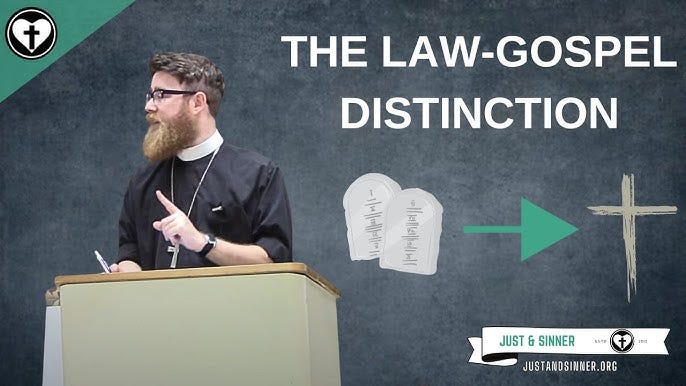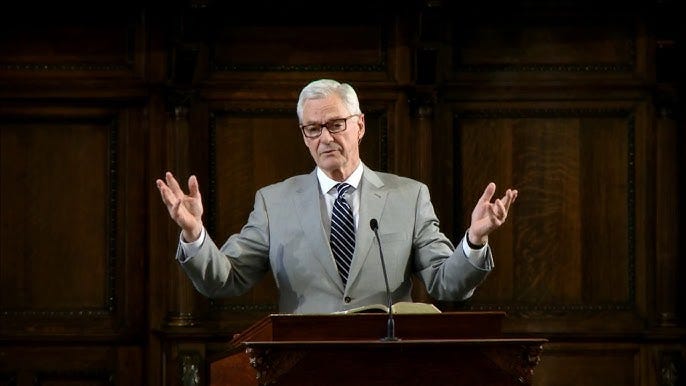Preaching Styles Across Traditions
Exploring the rich diversity of sermons while keeping our eyes on the central thread: the Gospel.
Sermons Shape Souls
Preaching is more than just words from a pulpit, it’s an expression of a church’s heart, culture, and identity. From the measured cadence of an Anglican homily to the raw passion of a Pentecostal sermon, each tradition carries its own rhythm, tone, and way of connecting people to God.
But what makes a sermon truly transformative? It’s not just about eloquence or delivery. At its core, preaching should answer one central question: does this point us to Christ?
Through years of study, first in seminary, now in my doctoral program, I’ve had the privilege of exploring these traditions firsthand. I’ve sat with bishops, spoken with pastors, and visited churches where the atmosphere shifted with each style. Sometimes, it felt like too much to take in, but one thing always stood out: the Gospel is the thread that weaves every faithful sermon together.
So, whether you’re drawn to the contemplative or the charismatic, let’s explore what makes each tradition unique, unpack some details you might not know, and reflect on why Gospel-centered preaching remains the foundation that holds it all together.
Anglican and Episcopalian Preaching: Where Tradition Meets Reflection
Anglican sermons are deeply rooted in the rhythms of the liturgical calendar, offering reflections that align with seasons like Advent, Easter, or Pentecost. These messages are often concise, around 15-20 minutes (depending on the preacher), and designed to complement the larger act of worship rather than dominate it. The sermon is just one layer of a rich focus of Scripture, prayer, and sacraments that guides the congregation into a worshipful encounter with God.
What makes Anglican preaching unique is its reliance on the Book of Common Prayer1, which not only shapes the sermon but the entire service. This structure creates a sense of global unity, you could walk into an Anglican church on the other side of the world and hear the same Scripture passages and themes being preached.
Insight You Might Not Know:
Anglican sermons often integrate Scripture, tradition, and reason in a way that fosters intellectual and spiritual balance. This isn’t a style that leans heavily on emotion or spontaneity. Instead, it appeals to those who find God’s presence in the order and continuity of the liturgy. Anglican preaching also prioritizes reverence and worship, leaving space for quiet reflection rather than crowding the service with excess words.
Who may appreciate this style:
This style resonates with people who appreciate structure and consistency in worship. If you find comfort in tradition, enjoy contemplative reflections on Scripture, or seek a worship experience that feels timeless and globally connected, Anglican preaching may be good for you. It’s particularly fitting for those who value thoughtful, measured sermons that invite reflection and foster reverence.
Baptist Preaching: The Call to Respond
Baptist sermons are unapologetically direct, centered on repentance, salvation, and the call for personal transformation. These messages often build toward a decisive moment, whether it’s a public altar call or an inward commitment to Christ. Expect preaching that doesn’t just inform but urges action, today, not tomorrow.
What many overlook is the deep historical rootedness of Baptist preaching in the revivalist traditions of the Great Awakenings2. Preachers like George Whitefield and Charles Finney pioneered a style that wasn’t merely designed to be heard but to provoke an immediate, heartfelt response. This revivalist DNA remains a defining characteristic of Baptist preaching, even in its modern forms.
At its core, Baptist preaching reflects the belief that "today is the day of salvation" (2 Corinthians 6:2). It bridges truth with urgency, engaging the heart as much as the mind. While some styles of preaching today shy away from calls to action, Baptist sermons, when shaped by the Gospel, offer a rest for the weary soul through their invitation to respond in faith.
Insight You Might Not Know:
Baptist preaching isn’t monolithic. Variations like “Reformed Baptist” or “Particular Baptist” bring theological nuances to the table, but the tone remains consistent—a sense of urgency paired with a Gospel focus. When done well, this style emphasizes not just what you should do but why—rooted in the grace and sufficiency of Christ.
Who may appreciate this style:
This style fits individuals who are inspired by direct, passionate messages that challenge them to take their next step in faith. If you appreciate sermons that call for immediate application and stir your heart toward action, Baptist preaching will resonate. It’s particularly suited for those who thrive on clarity, conviction, and the reminder that faith is not just something to believe but something to live out daily.
Lutheran Preaching: Grace in Everything
Lutheran sermons are grounded in their theological cornerstone: sola gratia3, or grace alone. This foundation shapes a preaching style that consistently distinguishes between Law (what God commands) and Gospel (what God freely gives). The result is a balance that convicts listeners with the demands of God’s Law while immediately comforting them with the assurance of Christ’s finished work.
One of the defining features of Lutheran preaching is its resistance to modern trends like personal storytelling or emotional appeals. This isn’t a lack of creativity; it’s an intentional commitment to keep the focus on Scripture and Christ, not the preacher. Every sermon is a declaration of grace, leaving you assured that salvation is not something to be achieved—it is something to be received.
Lutheran preaching also carries a theological depth that can be both enriching and challenging, depending on the listener’s background. In some settings, this high theology can feel inaccessible to those with less theological education, but when paired with a pastor’s sensitivity to the audience, it can bridge profound truths to everyday life.
Insight You Might Not Know:
Lutheran preaching reflects a distinct tradition of theological clarity, often drawing on the works of Martin Luther and other reformers. This commitment to Scriptural exegesis and the centrality of grace has found renewed appreciation in recent years, particularly through figures like Dr. Jordan Cooper and others leading a resurgence in Lutheran theology.
Who It’s For:
This style is perfect for those who value theological depth and a consistent focus on God’s grace. If you’re someone who struggles with feelings of inadequacy or the pressure to "do better" in your faith, Lutheran sermons provide a steady reminder of God’s unearned favor. It’s especially fitting for listeners who prefer sermons that prioritize Scripture over personality and offer a clear, Gospel-centered assurance of salvation.
Presbyterian and Reformed Preaching: Depth and Precision
Reformed sermons are deeply theological, often taking a verse-by-verse approach to unpack entire books of the Bible. This expository style aims to reveal the meaning of Scripture while consistently pointing to Christ in every passage. It’s not just about understanding the text; it’s about seeing how God’s redemptive story shapes every aspect of life.
While often perceived as intellectual or academic, a lesser-known aspect of Reformed preaching is its emphasis on application. These sermons bridge doctrine with real life, addressing how God’s sovereignty influences personal struggles, relationships, and even societal systems. It’s a preaching style that calls you to think deeply and act purposefully.
Insight You Might Not Know:
Reformed preaching doesn’t just focus on Scripture’s meaning; it views preaching itself as a means of grace4. Historically, it has been considered central to worship, with the preached Word seen as an encounter with God’s truth, not just a theological exercise.
Who It’s For:
This style fits listeners who are drawn to intellectual depth and long for a robust understanding of Scripture. If you thrive on sermons that challenge your mind while connecting the dots between theology and daily living, Reformed preaching will resonate. It’s ideal for those who seek to see God’s glory not just in salvation but in all of life.
Charismatic and Pentecostal Preaching: Chaos or Power?
Pentecostal sermons are dynamic, emotionally charged, and deeply experiential, sharing similarities with Baptist preaching while bringing a unique focus on the Holy Spirit’s power. Expect messages that emphasize transformation, healing, deliverance, and personal renewal, often culminating in a call to come forward for prayer or ministry.
What makes this style stand out is its openness to spontaneity. Pentecostal preachers often rely on the Spirit’s leading in the moment, creating sermons that feel alive, unfiltered, and deeply personal. As someone who grew up in this tradition, I can testify to its ability to move hearts, energize worship, and create a sense of expectation.
However, depending on where you go, the experience can range from inspiring to chaotic. So, BE CAUTIOUS.
If the experience is more powerful than the sermon, then you are in the wrong place.
Who It’s For:
This style resonates with those who crave an experiential connection to God and are energized by passionate, Spirit-led worship. If you’re someone who values personal testimonies, vibrant faith, and sermons that feel like encounters with the divine, Pentecostal preaching is for you. It’s particularly fitting for those seeking renewal, healing, or empowerment in their walk with Christ. But again, remain cautious.
Gospel-Centered Preaching Transforms
At its heart, Gospel-centered preaching transforms because it consistently grounds us in unchanging truths that reorient our lives:
Christ is the Hero: Every sermon must ultimately lead us to Jesus. It’s not about moralism, self-help strategies, or the preacher’s personal insights. The message should unveil Christ as the centerpiece of Scripture and the hope for every human heart.
Grace is the Method: The Gospel reminds us that God’s love isn’t something we earn through effort—it’s a gift we receive freely through faith in Christ. This truth disarms our striving and leads us into the rest and joy of living in His finished work.
Life is the Application: True preaching doesn’t stop at theology; it drives us to transformation. But this change isn’t fueled by guilt or obligation. Instead, it flows from gratitude for what Christ has done, shaping every area of life in response to His grace.
Missional in Practice: Gospel-centered preaching doesn’t leave us unchanged; it compels us outward. When we grasp the reality of Christ’s redemptive work, it reshapes our actions and vision for the Great Commission. How are we proclaiming this hope in our communities, workplaces, and across the globe? Gospel-centered preaching challenges us to live as ambassadors of Christ, carrying His love to a world desperate for restoration.
This kind of preaching does more than inform; it transforms, inspiring us to live for God’s glory and His mission in our day.
Finding Your Preaching Home
Whether you’re drawn to the intellectual depth of Reformed preaching or the passionate spontaneity of Pentecostal messages, the question remains: does it lead you to Christ? A sermon’s ultimate value isn’t in its style but in its substance.
The Toolkit
1. Tools to Find a Gospel-Centered Church
If you’re searching for a church that preaches the Gospel faithfully, these directories can help you locate options in your area:
9Marks Church Search: A directory focused on churches that emphasize expositional preaching and Gospel-centered ministry.
TGC Church Finder: A resource to discover churches that align with the core beliefs of The Gospel Coalition.
Acts 29 Network: A global network of Gospel-centered, missional churches.
EPC Churches: Churches from the Evangelical Presbyterian Church.
PCA Churches: Churches from the Presbyterian Church in America.
2. Sermon Evaluation Tools
For students or individuals wanting to evaluate sermons in more detail, consider using these resources:
How to Evaluate Sermons- Link
The Gospel Coalition Sermon Evaluator:
TGC Sermon Evaluation
Offers practical guidelines to discern whether a sermon is Gospel-centered.Faithful Preaching Rubric (from Expository Preaching courses):
Download Example Rubric Here
Designed for students in homiletics to assess Christ-centered preaching.
The Book of Common Prayer is a foundational text in Anglican and Episcopalian worship, first compiled in 1549 by Thomas Cranmer. It structures liturgical practices, prayers, and readings, creating consistency across congregations worldwide. Its language has deeply influenced both Christian worship and the English language.
The Great Awakenings were periods of religious revival in the 18th and 19th centuries, marked by passionate preaching and widespread conversions. Figures like Jonathan Edwards and George Whitefield emphasized repentance and personal faith, shaping Baptist preaching’s urgency and focus on decision.
Sola gratia (grace alone) is one of the five solas of the Reformation, emphasizing that salvation is a gift of God’s grace, not earned by human effort. This theological lens underpins Lutheran preaching, distinguishing Law (God’s demands) from Gospel (God’s provision).
Reformed theology views the preached Word as a "means of grace," a conduit through which God works to strengthen faith and deepen understanding of the Gospel. This elevates the sermon beyond mere instruction to a spiritual encounter.










So interesting! Thank you!!!